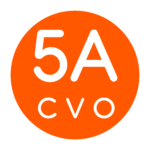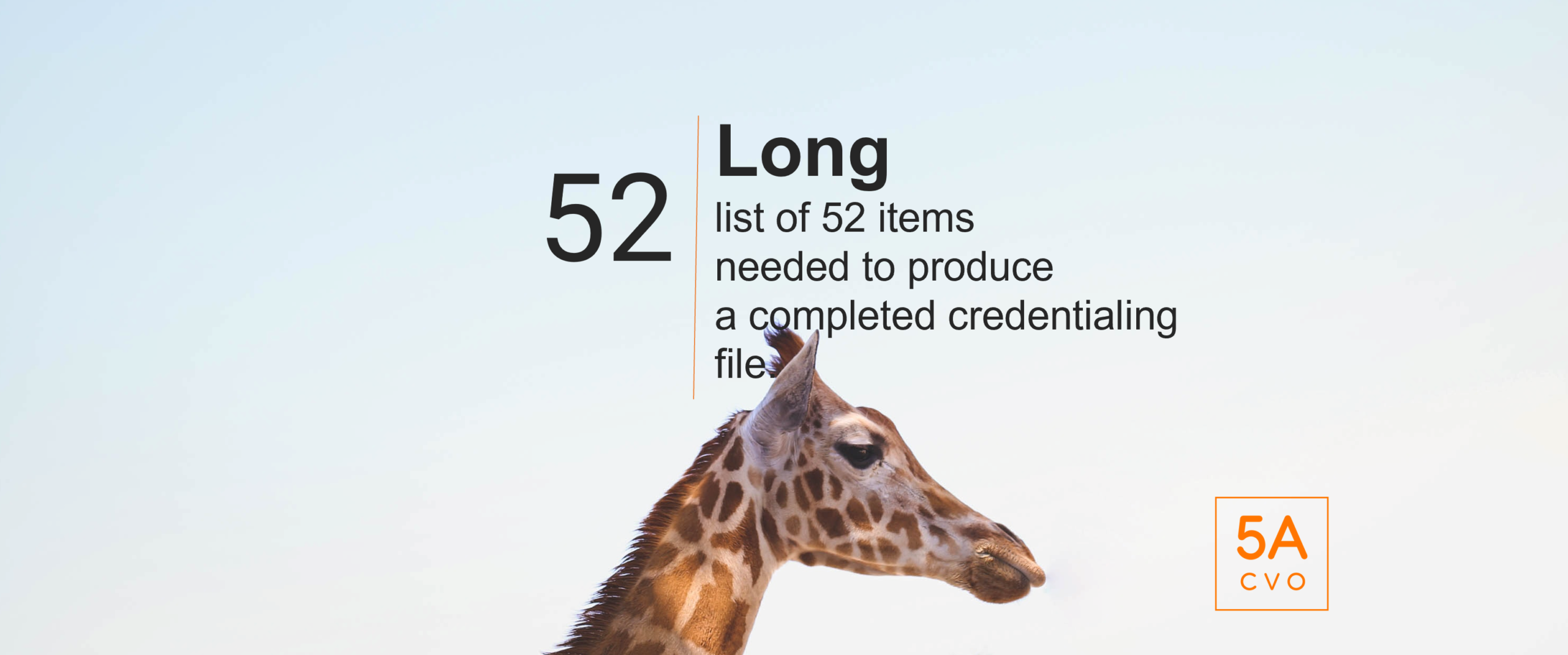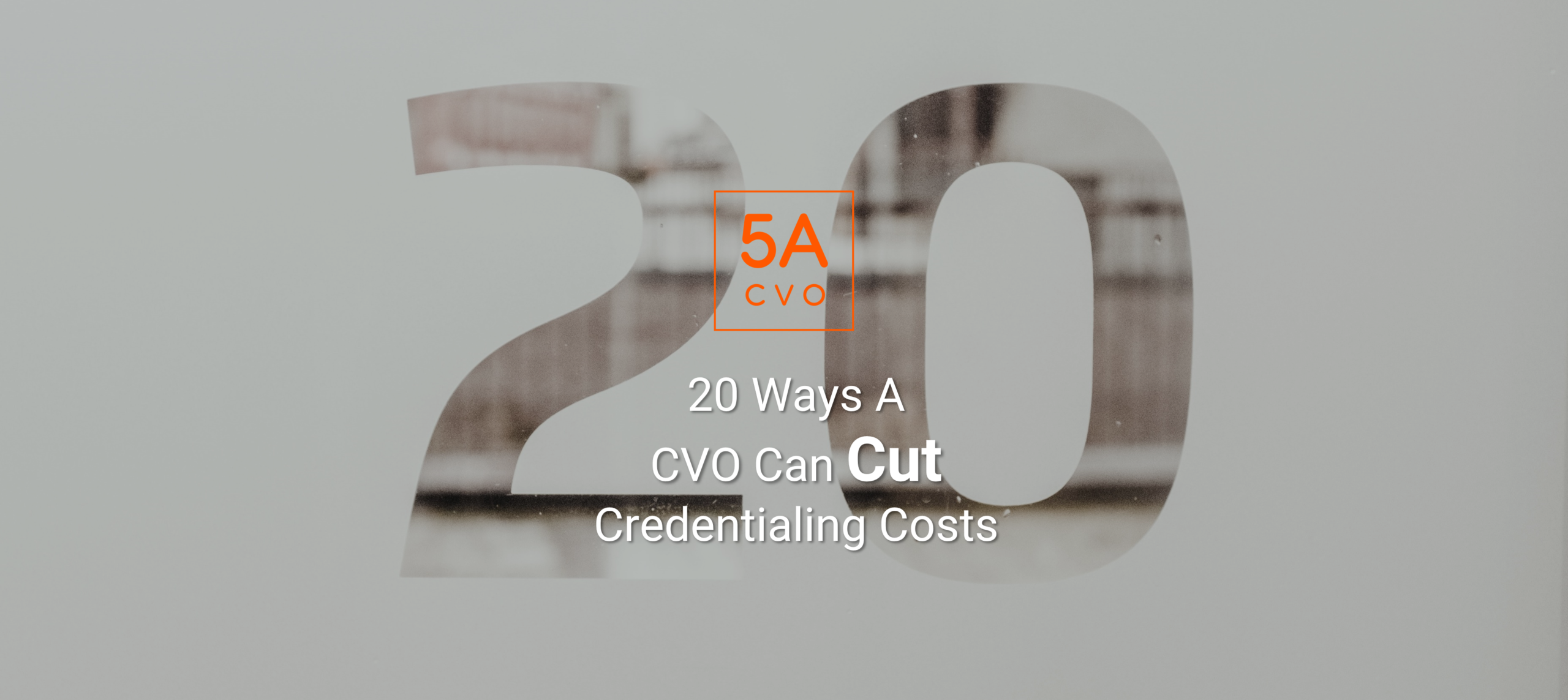In healthcare, experience matters. A medical provider’s history and credentials must be verified appropriately to keep patients safe. Providers and their organizations can perform the credentialing process themselves but strain their resources and possibly commit devastating errors. Alternatively, they can outsource the meticulous procedure to a CVO to ensure their patients will be cared for safely.
What is a CVO? Why should credentialing be handed to one? This article will answer these questions and list the top 3 benefits of working with a CVO for your credentialing, but first, let us discuss briefly just what is a ‘CVO.’
What is a CVO?
A CVO (credentials verification organization) works with organizations to provide primary source verification of a provider’s experience and qualifications. By taking on the responsibility of obtaining and confirming any relevant information on new and current providers, a CVO can reduce organizations’ administrative requirements.
The entire process has traditionally taken 52 steps to produce a file ready for presentation to a board or committee for review and approval. Depending on the provider’s specialty and service location, the credentialing process may be more or less exhaustive.
A few of the 52 conventional credentialing steps include:
-
- Sending and receiving the provider application packet.
- Acquiring applicable certificate copies of Board, ECFMG, Medical School, Internship, Residency, Fellowship, and two years CME.
- Acquiring TB, MMR, varicella, and flu vaccination records.
- Attesting any conflict of interest.
- Confirming any Medicare and Medicaid sanctions (OIG) and exclusions (SAM).
- Confirming state medical licensure.
- Evaluating the explanations of time gaps and claims history.
- Getting CPR, ACLS, and PALS certificate copies.
- Obtaining a copy of the provider’s current certificate of insurance.
- Obtaining an Allied Health Professional’s Supervising Physician’s Statement.
- Obtaining professional peer references.
- Performing an extensive criminal background check.
- Researching primary and out-of-state licenses for disciplinary actions.
- Reviewing and confirming AMA and AOA Profile.
- Reviewing the disclosure’s questions and answers.
- Running a National Practitioner Data Bank query.
- Verifying DEA and CDS certification (if applicable).
#1 Benefit Of Working With A CVO: Save Money
Proper credentialing can create more billing opportunities for providers. The sooner they are credentialed and enrolled into health plans and networks, the sooner they can begin billing. Outsourcing credentialing to a CVO can save providers and their organizations money. Cutting costs and generating more revenue can lift the fortunes of any medical organization.
Here are a few ways a CVO can save money:
A CVO can reduce labor expenses.
A credentialing specialist’s average base salary is $52,000 a year. Practices can forego hiring a specialist and entrust credentialing to existing staff. However, they must ensure their team is sufficiently trained in every aspect of the process. Training can take time. Plus, there is the chance that staff will not learn the intricacies of credentialing, potentially exposing their organizations to dangerous, unqualified providers.
In some instances, hiring a credentialing specialist could be the best decision. However, the choice in itself can prove expensive. Estimates claim that the costs of employing one person can be up to 1.4 times their base salary. While this increase might seem paltry, it can impact a practice fighting to stay within its budget. Adding to the struggle is the fact that practices should hire experienced specialists. Expertise comes at a price. A seasoned specialist might request a higher salary; typical total compensation may reach $100,000 for a Senior Credentialing Specialist, including wages, taxes, retirement, and healthcare benefits.
Outsourcing credentialing to a CVO like 5ACVO can be a more cost-effective option, possibly saving organizations $21,000 in taxes and benefits per employee.
A CVO can cut supply costs.
Credentialing can take a toll on physical resources. The average office worker in the United States uses 10,000 sheets of copy paper a year, costing their business around $76 per employee. Organizations have to store their paperwork somewhere. A file cabinet can cost $1,500. Depending on the organization’s storage requirements, off-site storage can cost as much or more. A CVO can reduce a practice’s paperwork load, meaning there would be less paper to purchase and store. A materials budget can have more room to breathe without bloated expenses weighing it down.
A CVO can decrease errors.
Credentialing mistakes can cost a practice or other medical organization money. Although the expense may not be apparent at first or even occur, the risk remains costly. A healthcare provider who is not fit to administer treatment can injure patients. Their negligence can result in hefty medical malpractice payouts. The average malpractice payout is approximately $101,000. Just a single credentialing error can expose an organization to an expense of this magnitude or to one that is much higher.
A CVO employs experts focusing on credentialing, helping to ensure that the process’s best practices are followed closely.
#2 Benefit Of Working With A CVO: Access to Experts
Medical malpractice can ruin people’s lives and livelihoods. Providers must be able to treat patients according to the accepted standards of care. A highly effective credentialing team can reduce mistakes and increase patient safety.
A CVO can reduce mistakes.
An inexperienced credentialing specialist or office staff member who fails to properly credential providers could raise their organization’s chances of encountering medical malpractice claims and lawsuits. Simple oversights are enough to allow a poor provider to pass through the process. Busy office staff workers might skip necessary credentialing steps, which can be a monumental mistake.
A CVO only conducts primary source verification, allowing them to complete their jobs without distractions. Their determination can mitigate or outright eliminate mistakes that could cost medical organizations a fortune.
A CVO can increase patient safety.
Patients should always be the focal point of health care. After all, health care exists to serve them, but in-office credentialing is prone to errors that can endanger patients. A CVO can prevent unfit providers from injuring people who want to overcome their debilitating conditions. Malpractice is more than financial damages. It is about the quality of care or lack thereof that can hurt more than help.
#3 Benefit Of Working With A CVO: Cut Non-Profit Producing Activities
When office staff is busy performing the 52-step credentialing process, they cannot do anything else. A credentialed provider can eventually bring in revenue, but their organizations can lose substantial revenue or billing opportunities when unforeseen credentialing delays occur.
A CVO frees office staff to pursue those opportunities. Outsourcing credentialing can become a solution that benefits everyone. Collaborating with a team of credentialing experts can help ease many office headaches. However, just what constitutes a ‘team of credentialing experts’? Before we move on to the six bonus benefits of using a CVO, let us quickly define what makes a highly effective CVO team.
What Makes a Highly Effective CVO Team?
What makes a highly effective credentialing team? They must have the right experience, expertise, and humble nature.
√ Experience
A CVO with the right experience can offer providers and their organizations superior service. A credentialing specialist seeking the Certified Provider Credentialing Specialist certification must have at least three years of experience out of the last five years in the healthcare industry. They must also have a minimum of 12 consecutive working months out of the past 24 months in the industry.
√ Expertise
Knowledge applied over time builds experience. Therefore, a CVO must have the knowledge and skills to perform its credentialing duties. The wrong knowledge can lead to mistakes that can cause billing and malpractice delays. Expertise comes from education and keeping up with credentialing standards as they evolve. A CVO knows what to do and how to keep their skills up-to-date.
√ Humble nature
A CVO that thinks they know everything might be resistant to new information and technologies that can make their job easier and better. Their procedures might stay the same with the times. A humble team can step back and look at their job objectively. They can recognize that there could be other ways to perform their work. Acceptance can lead to adopting new techniques to ensure a perfect credentialing process.
BONUS Content: 6 Bonus Benefits Of A CVO
The benefits of outsourcing credentialing extend beyond saving money, accessing experts, and cutting non-profit-producing activities.
- A CVO can expedite the processing: In-office credentialing can take between 90 to 120 days from start to finish. Errors and oversights can stretch the process past 120 days. A CVO like 5ACVO can pare down the 52 credentialing steps to 6, vastly speeding up the process so providers can bill quicker than ever.
- A CVO can streamline the process: Reducing credentialing to 6 steps creates fewer opportunities for things to go wrong. Streamlining the process also makes it easier for the uninitiated to understand what goes into ensuring patients are well cared for.
- A CVO can raise practice staff morale: Removing tedious work can ease the stress of everyone who works in practice, boosting practice morale. Staff not tasked with complicated work can pursue their duties unencumbered by heavy burdens, creating a better environment for patients.
- A CVO grants tighter control: Transferring credentialing to an external entity does not mean losing control of the process. A CVO like 5ACVO gives its clients access to its Credentialing Web Portal. This means clients can have greater control over the process and all the information that goes into it. The Web Portal can be used to monitor credentialing documents. The Web Portal can also keep sensitive information safer than a file cabinet. Since today’s world values data security more than ever, this aspect makes a CVO valuable.
- A CVO can offer one point of contact: Providers and office administrators might need more time to track down the right person to help them with their credentialing issues. They might have the time but have multiple phone numbers and email addresses that ultimately lead them nowhere. A CVO that offers them a single point of contact can prove more valuable than one that does not. Providers do not have to spend much time hunting for information. They can send one email or one call to get what they need.
- A CVO can work with its family of companies: Not every CVO is fortunate enough to be part of a group of companies that benefit one another’s clients. As part of the Fifth Avenue Healthcare Services family, 5ACVO can team with Primoris Credentialing Network to help providers enroll in health plans and networks. Once 5ACVO completes credentialing, Primoris can allow providers to apply to 25+ delegated options with one application. These time-savings can let providers bill sooner. 5ACVO can also work with Fifth Avenue Agency to help providers with their medical malpractice and professional liability insurance needs. The agency’s impartial expertise enables them to give providers customized recommendations that speak to what they want instead of what insurance companies want.
Working with a CVO is Worth the Investment
Teaming up with a CVO can make for smarter, simpler, and better credentialing. Providers and administrators with less work, costs, and risk can do what they were meant to with a clear mind. When they outsource to a CVO, they can enjoy more control, resources, and rewards.
Credentialing can be simple and inexpensive. Outsourcing credentialing can decrease the adverse impacts of primary source verification and increase the positives. The reasons to use a CVO prove these points. Providers who partner with a CVO can help themselves and their patients in ways they never imagined.
More information about 5ACVO
5ACVO is an NCQA Credentialing Accredited specializing in credentialing and primary source verification and is part of the Fifth Avenue Healthcare Services family. 5ACVO sister companies include Fifth Avenue Agency (MPLI and medical malpractice insurance specialists) and Primoris Credentialing Network (credentialing and provider enrollment specialists with 54+ health plan and network provider enrollment options).
This article was initially published by 5ACVO here. For more information on 5ACVO, please visit 5ACVO.com or Contact Us.

















